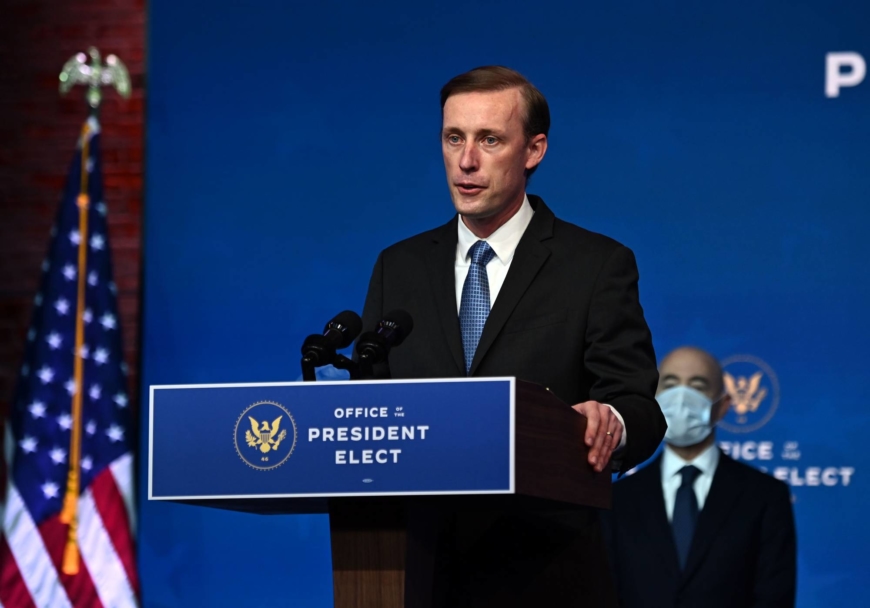[ad_1]
Washington – U.S. President Joe Biden’s national security adviser, Jake Sullivan, said Friday that the so-called Quad framework consisting of the United States, Japan, Australia and India will play a key part in Washington’s policy in the Indo-Pacific region amid China’s rise.
“I think we really want to carry forward and build on that format, that mechanism, which we see as fundamental, a foundation, upon which to build substantial American policy in the Indo-Pacific region,†Sullivan told an online event organized by a Washington-based think tank.
The grouping of the four major Indo-Pacific democracies has been pushed by the administration of Biden’s predecessor, Donald Trump, as a framework to counter China’s growing clout in the region, with increasing focus on whether it could evolve into a formal security alliance akin to NATO.
Robert O’Brien, former national security adviser for Trump, said at the same event hosted by the United States Institute of Peace that the Quad may be the “most important relationship we’ve established since NATO at a high level.â€
Officially known as the Quadrilateral Security Dialogue, the Quad originally arose in 2004 in response to the Indian Ocean earthquake and tsunami.
After a period on hiatus, it was revived in 2017 and has since grown beyond humanitarian assistance and disaster relief, most recently focusing on efforts to advance “a free, open and inclusive†Indo-Pacific region.
For the first time under the framework, the foreign ministers of the four countries met in New York in 2019. The second meeting was held in Tokyo last October in the midst of the coronavirus pandemic.
Then-Secretary of State Mike Pompeo said after attending the October meeting that the U.S. government hopes to “institutionalize†the format, saying that the four powerful economies and democracies have the capacity to “work together to push back against the Chinese Communist Party.â€
New Secretary of State Antony Blinken highlighted during a recent phone call with his Australian counterpart, Marise Payne, the importance of cooperation through mechanisms, including the Quad, to tackle challenges such as the pandemic and climate change.
Sullivan did not explain in detail the role he thinks the Quad should play in the region during the think tank event.
On China, Sullivan on Friday signaled the need for the United States to maintain its tough stance, saying that Washington should be prepared to “impose costs†on Beijing for its crackdown on its Muslim Uighur minority in the Xinjiang region and in Hong Kong as well as for its threats toward Taiwan.
Sullivan, the national security advisor, said that the new administration’s strategy included renewing alliances and robust investment in technology to ensure the United States retains a critical edge.
In a veiled reference to defeated president Donald Trump, whose baseless allegations of election fraud culminated in a mob attack on the U.S. Capitol, Sullivan said that China was becoming more explicit in contending that it had a better model.
“They’re pointing to dysfunction and division in the United States and saying — ‘take a look at that, their system doesn’t work, our system does,’†Sullivan said.
“So step one,†he said, “is to refurbish the fundamental foundation of our democracy.â€
“And that goes for everything from our democratic system itself to issues of racial inequity to issues of economic inequality — all the things that have contributed to the shine coming off the American model.â€
The Biden administration has indicated that it will maintain Trump’s tough line on China, in substance if not always in tone, on issues from trade to human rights — including what the United States has described as genocide against the mostly Muslim Uighur people in Xinjiang.
“With our allies and partners in both Europe and Asia, we represent well more than half of the world’s economy, Sullivan said, saying that provided “the kind of leverage we need to be able to produce outcomes.â€
O’Brien said the Biden administration was “off to a great start on China.â€
Sullivan said that the Biden administration would also heavily promote research in areas including artificial intelligence, quantum computing, biotechnology and clean energy.
“That requires a combination of working closely with allies and partners in making aggressive, ambitious public investment here in the United States so that we stay on the cutting edge.â€
In a time of both misinformation and too much information, quality journalism is more crucial than ever.
By subscribing, you can help us get the story right.
[ad_2]
Source link






